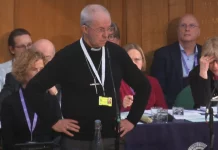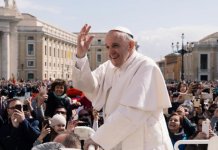With the Twelve Days of the celebration of Christmas now behind us, we shift the weight of our attention from celebrating the feast to living the feast.
Living in the light of the birth of Christ provides a different quality of life, of self-understanding, and a different quality of social relationship to the alternative secular solipsism. As our society loses its Christian memory, the task of evangelism is not to lament what is lost but to offer as medicine what can heal. The Incarnation heals. More specifically, the embodiment of the Logos heals.
Our political and ideological neighbours and, above all, our neighbours’ children have been captured in the quicksand of a new relativism. It is a kind of self-generated madness that has disturbed and distorted their self-understanding, and the way it expresses sexuality.
Pollsters have established that 20 per cent of so-called Generation Z – the demographic cohort succeeding Millennials and born around the mid-to-late 1990s – is likely to identify on the “LGBTQQIP2SAA” spectrum, while more than 5 per cent of Americans aged 18 to 30 identify as “transgender” or “nonbinary”. The speed of this revolution is giddying.
That in itself would be serious enough, if it wasn’t also a means of falling prey to one of the most serious challenges to our contemporary society: the cult of sterility.
Same-sex relationships are incapable of producing their own children, and sexual transitioning involves chemical and surgical castration of an ever larger proportion of our disturbed – and disturbing – teenagers, rendering them perpetually infertile.
The theologically astute will immediately see that sterility represents the opposite of what God intends for humanity, unfolded for us in Genesis as “be fruitful and multiply”. So we are entitled to ask theological questions about the nature of the struggle we find ourselves in and upon which the future of our civilisation depends.
In those terms, it begins to look as though it is as much a struggle of God v. anti-God, as it is an argument over the best kind of anthropology.
The philosophical argument between Catholics and those pursuing multi-diversity is about whether reality is – for the latter – created in the imagination, or instead gifted to us to accept and interpret. The trans phenomenon is founded on a desperate struggle between the mind and the body’s given biology. It is as if what has been given by God is being consciously or unconsciously repudiated and rejected.
The implications of God taking flesh – body, humanity – are endlessly re-creative. The animal meat of our body, destined for decay, becomes infused with spiritual and potentially eternal significance and purpose. Our humanity is best and most realistically received as a gift from God.
Without this new understanding that our humanity is taken into the Godhead and infused with a new potentiality, we become prey to distortions of our real purpose. The burgeoning trans movement depends on the assumption that our biology is not a gift to be welcomed and treasured but something we have the power to change at will, aided by the pharmaceutical and medical industries. The impetus to change our biology comes from a repudiation of this sense of gift and associated responsibility and potentiality.
The birth of God as man, and the role of Mary as theotokos – the Greek for “God-Bearer” – reminds us that our biology is not only a gift, but a gift pregnant with meaning; a meaning that unfolds as we, in the main, live lives fruitful in co-agency with God, giving life in families.
This embodiment allows us a spiritual intimacy that even the angels do not have. As St Faustina wrote in a dairy entry (1804): “If the angels were capable of envy, they would envy us for two things: one is the receiving of Holy Communion, and the other is suffering.”
The absence of any understanding of this privilege of gifted embodiment leaves people vulnerable to the solipsism of self-invention. We become the gods who decide our natures. It is just one more version of the age-old sin of pride, in which we replace God with ourselves. But to our great harm.
It would be bad enough if this journey into self-definition just pitted our biology against our mental will and imagination, but in the vacuum that the loss of confidence in Christian faith leaves, we become vunerable to other more mercenary ideological and monetary interests. As we are now experiencing with trans ideology that culminates in transhumanism.
The investigative journalist Jennifer Bilek believes this is no natural phenomenon or uprising like first wave feminism, for example. She points out that there is no evidence of generations of trans people being cruelly oppressed, or of a minority needing representation. The “movement” was invisible ten years ago. On the contrary, transgenderism is a top down ideology with close links to the transhumanist movement and megamoney-backed initiatives which can be traced back to Silicon Valley scientists in the early 2000s.
It is not about human rights but the creation of an ideology which says you can choose your sex. It is further driven by money-backed “grooming” from parts of the media and other institutions to “convert” people – perhaps unwittingly – to their broader transhumanist goal.
Bilek has followed the money and shows us billions of dollars given by big foundations to back and incorporate this ideology. The message comes from on high and its latent transhumanist purpose is not progressive but malign.
Read it all at the Catholic Herald










